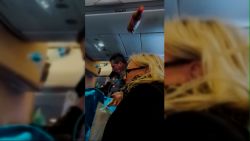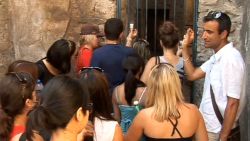Travelers in the United States are used to tipping a multitude of people, from the baristas who make their frothy coffee concoctions to restaurant servers, parking valets, hotel housekeepers and Uber drivers.
But tipping a flight attendant? It’s largely unheard of.
Almost all domestic US airlines have policies prohibiting flight attendants from accepting tips, but one ultra-low-cost carrier is bucking that tradition. About three years ago, Frontier Airlines introduced new technology to its inflight payment system that explicitly gives passengers the option to tip flight attendants.
Not that anyone seemed to notice at the time.
Tipping a flight attendant was a new concept for J.T. Genter, a senior writer at The Points Guy website, who has flown over 350 flights on 51 airlines in the past three years.
Several weeks ago, Genter recounted his surprise at being prompted to tip his Frontier flight attendant after ordering a can of ginger ale. His anecdote went viral and got many travelers wondering if flight attendants will be the next group of workers we’ll be tipping.
Behind the mentality
“We appreciate the great work of our flight attendants and know that our customers do as well,” says Jonathan Freed, a Frontier spokesperson. “Tipping is entirely at the customer’s discretion, and many do it.”
But it’s not easy to change tipping culture.
“There can be many motivations for why we want to tip someone,” says Michael Lynn, a professor at Cornell University’s School of Hotel Administration, who has written extensively on tipping.
“In general, the dynamic is that we tip people in jobs that are lower status than us. My guess is that most people don’t think of flight attendants as being lower status.”
Perhaps not. “But it’s a really hard job. These are people who do a really important job and don’t earn tremendous sums of money for doing it,” says Seth Kaplan, founding editor at Airline Weekly.
So many hats, so little time
Part of what makes a flight attendant’s job difficult is that they don so many hats.
“Flight attendants are certified for our safety, health and security work,” says Sara Nelson, International President of the Association of Flight Attendants, the union that represents 50,000 flight attendants at 20 US airlines, including Frontier. As “aviation’s first responders,” says Nelson, the flight attendant’s primary responsibility is to ensure the safety of passengers.
Of course, flight attendants also serve food and drinks, and the service component of the job is typically what is most visible to passengers. “In terms of where they see flight attendants putting most of their time and energy, it’s mostly serving passengers,” says Lynn.
Fewer passengers may realize that a flight attendant is also a salesperson.
“On almost every airline in the United States, flight attendants are getting on the loudspeaker and announcing that they have this great deal on a credit card. When people get approved for the credit card, the flight attendant gets a bonus,” says Brian Sumers, aviation business editor at Skift, the travel intel site.
'Mad Men' meets 'Airplane:' Vintage photos show aviation's golden age
That sales hat is considerably bigger if you work on an ultra-low-cost carrier like Frontier, where everything, from overhead bin space to non-alcoholic beverages, costs extra – and that’s where tipping comes in. When a passenger buys a bottle of water, can of soda or bag of chips, the flight attendant presents the bill on a tablet interface that includes a gratuity option.
“We had to learn the interface as part of the flight attendant training program when we started,” says a woman who worked as a Frontier flight attendant for three years, until late 2018, and has asked not to be identified for fear of negatively impacting her career within the industry.
Flight attendants can control whether to reveal the tip screen before handing the tablet to the passenger for a signature.
The flight attendant says she would occasionally skip the tip screen if a passenger only ordered a bottle of water or if there was a big language barrier. “It sometimes created awkward interactions with passengers and it didn’t make a huge impact in my take-home pay.”
She notes that she never made more than $100 in tips in a single month, even though she worked significantly more than full-time hours.
“Full time” for flight attendants is significantly more than 40 hours a week.
Flight attendants are only paid for hours when the door to the aircraft is shut, which means they end up working a ton of off-the-clock hours. This is an industry-wide guideline and not exclusive to Frontier. Tipping could become one way to help cover that technically unpaid time.
“I definitely used the tipping feature on my tablet,” she adds. “Frontier flight attendants are the lowest paid in the industry, so a little bit of extra cash from the tips was greatly appreciated.”
For comparison, Frontier flight attendants make 25-30% less than flight attendants at another national ultra-low-cost carrier, Spirit Airlines, according to the Association of Flight Attendants.
Tipping as appeasement
Nelson says Frontier introduced tipping around the time it began negotiating a new contract with the flight attendant union “in hopes it would dissuade flight attendants from standing together for a fair contract – and in an effort to shift additional costs to passengers.” Contract negotiations between the two parties have been going on since 2016.
“It’s not going very well, and it’s getting heated on both sides,” says Sumers. Frontier flight attendants have picketed at Frontier-hub airports since last spring and, last November, they authorized a strike.
Frontier tweaked its tipping policy at the beginning of the year. Flight attendants used to pool their tips, “but as the program matured over the past three years, flight attendants asked that individuals be able to keep their own tips,” says Freed.
In response, flight attendants say they made that request only to gain greater transparency. “Even though we were told tips got split evenly among the crew, we never got any reports,” says the former Frontier flight attendant.
While the AFA has always objected to tipping flight attendants, says Nelson, “our union also ensures this management initiative is implemented fairly and fully. Recently, management failed to properly distribute the tips passengers intended to give to the crew.”
Follow the industry leaders
“I definitely don’t know a lot of Frontier flight attendants who would be upset if tipping just went away,” says the flight attendant.
Instead, she thinks the company is going to use tipping as an incentive to increase sales. “I always heard rumors that the next step was going to be a quota for drinks and snacks we had to sell on the plane.”
“I can’t say that I’m surprised it’s Frontier that came out with this first instead of, say, American, United or Delta,” says Sumers. “Sometimes an ultra-low-cost carrier will do things that other airlines won’t in order to lower costs and to keep revenue up.”
According to a 2018 report from Airline Weekly, the no-frills carriers tend to have better operating margins than most of the legacy carriers. Whether the two other national ultra-low-cost airlines will follow Frontier’s lead and introduce tipping is anyone’s guess. For now, Spirit Airlines and Allegiant Air don’t include tipping in their customer-payment systems.
“But it is a very competitive industry,” says Kaplan. “If you have Frontier doing this and getting away with it – and I don’t mean to say that as that it’s something nefarious – but if Frontier is doing it then I’m sure it’s something that Spirit and Allegiant are looking at, too.”
Nothing would surprise Sumers. “We tip everywhere else we go,” he says. “Why shouldn’t we tip on an airplane?”
Suzanne Rowan Kelleher is a Saratoga Springs, NY-based travel writer and editor who covers travel trends, culture, food and family travel.

























